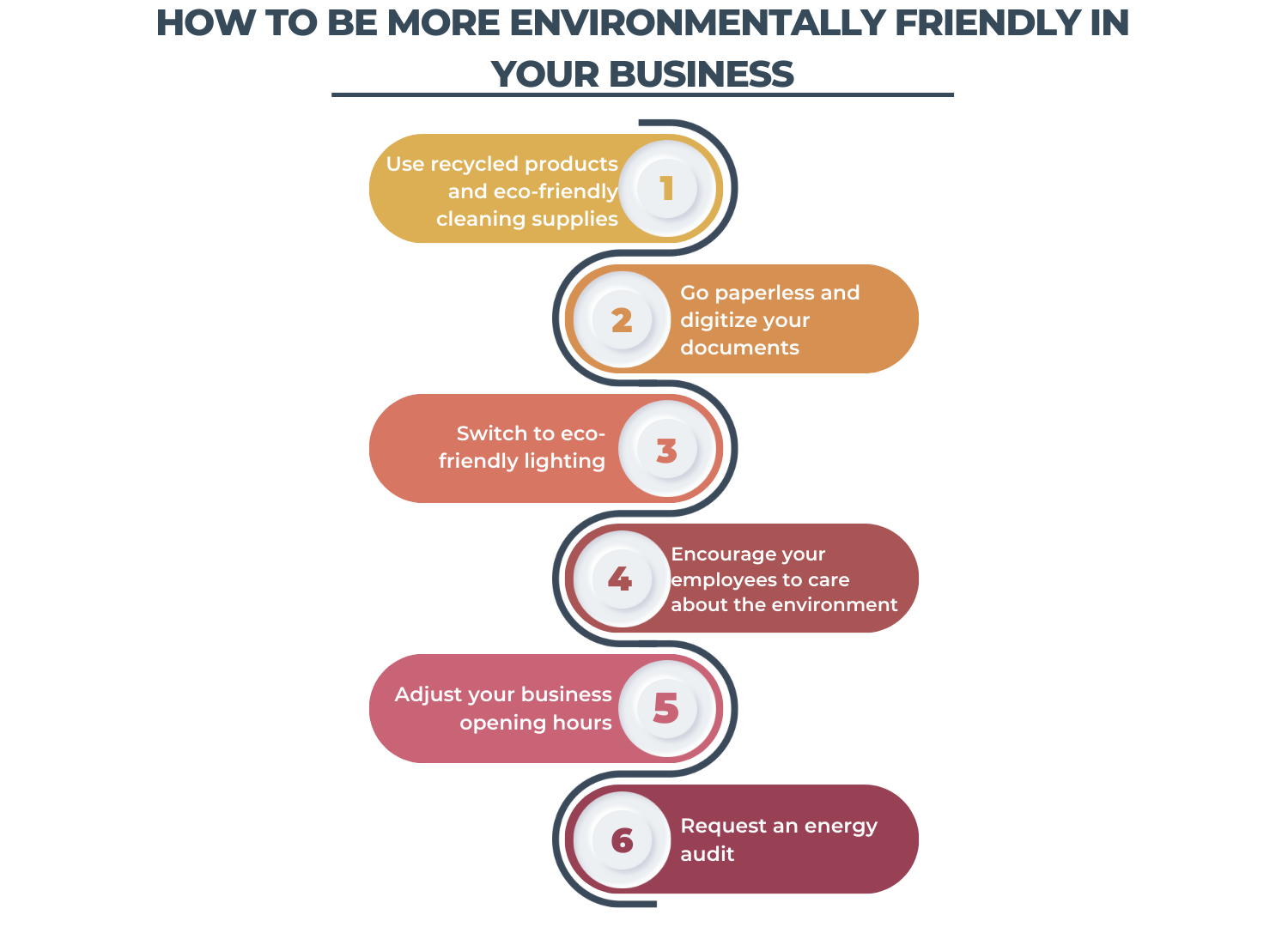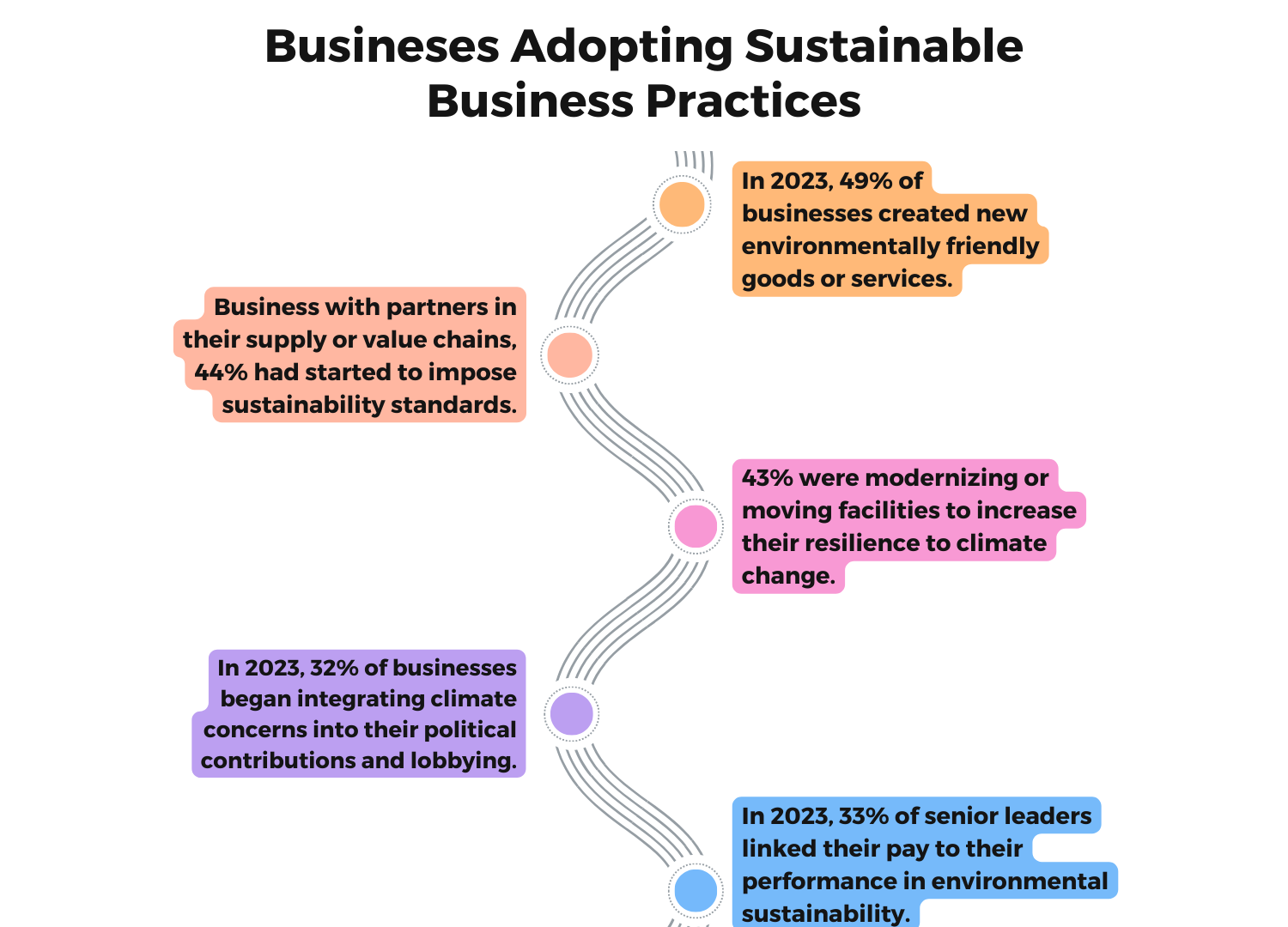Table of Contents
Sustainable business practices are a growing necessity in the business world. The need for sustainability is driven by the call to address the increasing environmental concerns to promote long-term viability. NASA estimates that there is a greater than 95% chance that human activity is warming the earth. Since human industry depends heavily on resources, land, fossil fuels, and continuous production and consumption, it plays a significant role in climate change. There is increasing pressure on a global scale to minimize environmental effects. Electronic data interchange is emerging as a powerful ally that may assist businesses in realizing their green objectives. Fundamentally, EDI services make it possible for partners to exchange business documents in standardized electronic formats. This happens between computers in an easy-to-use manner. Sustainability & EDI drastically reduce a company’s carbon footprint by streamlining operations by doing away with paper-based procedures.
“People should have values, so by extension, a company should. And one of the things you do is give back. So how do you give back? We give back through our work in the environment, and in running the company on renewable energy. We give back in job creation.”
– Tim Cook, CEO of Apple
Reducing the amount of paper means protecting trees, using less energy to produce paper, and lowering pollution from paper waste. But EDI offers more advantages for the environment than just that. Adopting this technology also entails releasing the physical storage space that is normally necessary for document storage. Smaller office areas, less energy used for lighting, heating, and cooling, and a decrease in greenhouse gas emissions follow from this.
Beyond its benefits, EDI promotes sustainable practices through improving operational effectiveness. Transaction times and resource requirements decrease due to automation and speed up business processes. This makes sure of long-term sustainability for businesses.
What Does Sustainability in Business Mean?
Sustainability refers to running a firm without adversely affecting the environment. An environmentally friendly company helps the community and economy. They depend on a healthy world by acting in the best interests of the local and global environment. An environmentally conscious company thinks about its effects on society and the environment in addition to earnings. Sustainable business practices help maintain the integrity of the building in which it functions, creating an atmosphere that fosters the growth of the enterprise.
The triple bottom line is a concept that sustainable businesses follow. It was first used in 1994 by John Elkington. He is the founder of the British consulting firm SustainAbility. Profits, people, and the environment are the three pillars of this.
Optimize Your Supply Chain with Our Sustainable EDI Solutions
Integration of Sustainable Business Practices
Even though environmental protection gained popularity in the United States forty years ago, businesses worldwide are now required to integrate environmentally sustainable business practices. Any serious business plan, budget, or purchasing policy produced today needs to take sustainability into account. This includes everything from primary manufacturers to international merchants, transportation providers to warehousing services.
Efforts to reduce waste and pollution by increasing the efficiency of current operations are encouraged. Some cases demanded, by forward-thinking firms in light of the growing interest in the responsible use of natural resources. For instance, the Environmental Protection Agency has partnered with 78 Fortune 500 companies. These include Google, Apple, Cisco Systems, Microsoft, Intel, and Kohl’s Department Stores. They aim to become “Green Power Partners.” This designation is given to businesses using more than 13 billion kilowatt hours of green energy annually.
Additionally, significant companies are making improvements to sustainable business practices. This includes companies like PepsiCo, Coca-Cola, General Electric, Nike, and Starbucks. These businesses have set an example. However other companies might also gain from incorporating sustainability practices into their current business strategies. Retailers and suppliers may use proven EDI outsourcing to lower overall expenses, optimize supply chain operations, and improve business efficiency. This will have a good impact on both their bottom lines and the environment.

Role of Individuals to Increase Business Sustainability
Everyone can make efforts to live and work more sustainably. However, certain individuals are better positioned to bring about change. Especially when it comes to enhancing sustainable business practices in the corporate world.
Entrepreneurs and Leaders in Organizations
Making wise top-down decisions requires organizational leadership training and experience to bring about sustainable business practices. Organizational leaders and business owners can make strategic decisions regarding sustainability. These decisions are advantageous to the company, its customers, its staff, and the environment. Leaders are arguably the most crucial component of the chain. Owners and executives have the potential to influence policy and promote innovation, as well as the intellectual capacity to determine the best sustainability projects and strategies.
Managers and Administrators
Managers and administrators know all the ins and outs of a company. To be successful in the future of business administration, one must be ready to approach complicated problems from novel angles. Possessing the knowledge and abilities to come up with innovative, sustainable business practices is also the key. Because of their more practical roles, administrators, managers, and supervisors can offer invaluable insights and a unique grasp of how to enhance organizational sustainability.
Professionals in Human Resources
Human resources strategies are important to creating and sustaining business practices. Your company’s HR division can be a key player in corporate sustainability. They can help with the formulation, execution, and assessment of corporate sustainability policies. They can help in changing the company’s culture and bringing a long-lasting change. Establishing a corporate culture that upholds your principles. It also encourages employees to voice their opinions—including those about sustainability—which is crucial. To make new hires and current staff feel appreciated and acknowledged as important contributors to sustainability initiatives, the HR department can serve as a cultural ambassador.
Employees
Important contributions to sustainable business practices can also emerge from the inside; they don’t always have to come from the top down. Employees at a Unilever tea factory in England, for instance, saved the company €47,500 and decreased the waste of 9.3 tons of paper by recommending the company adjust the size of paper tea bags, according to Stanford Social Innovation. These workers were directly involved with the product, thus they were aware of all the areas that could be improved. Encourage staff members to express their opinions about how your company may become more environmentally friendly. The outcomes might support profitability as well as sustainable business practices.
Our Eco-Friendly EDI Services Help You Embrace Efficiency and Sustainability
The Advantages of Business Sustainability
Sustainability & EDI benefits not just the environment and society as a whole, but also the company. A few of the numerous advantages of running a more sustainable company are as follows:
1. Financial Savings
Saving money is one of the green business initiatives’ most direct advantages. Over time, energy-efficient techniques can dramatically lower utility expenditures. Savings can be significant even with small changes like installing LED lighting, buying energy-efficient appliances, and properly insulating buildings. Moreover, waste management costs can be significantly decreased by implementing sustainable business practices for recycling, reuse, and trash reduction. Businesses may even be able to make money by selling recyclables and other products by putting recycling programs into place.
2. Improved Image of the Brand
More than ever, consumers now are concerned about the environment. A company’s reputation is enhanced and public sentiment is aligned when it becomes green. Companies that put a high priority on sustainability are frequently seen as ethical. While retaining the loyalty of current clients, this positive brand image can draw in new ones. Businesses might potentially enhance customer retention and referrals by exhibiting their commitment to sustainability and drawing in a devoted client base with similar values. Consumers who believe that a brand is environmentally friendly may wind up becoming brand evangelists, spreading good word of mouth and improving the company’s standing even more.
3. Creating a Differential Advantage
Businesses that disregard sustainable business practices run the danger of falling behind. Environmentally friendly practices become more widespread. Businesses may establish themselves as leaders in their respective industries. This can be done by staying ahead of the curve and introducing green initiatives early on. By being proactive, this approach can open doors to new markets and increase networks by fostering collaborations with other like-minded businesses.
4. Adherence to Regulations
Environmental impact laws from the government are getting stricter. Sustainable business practices help organizations adhere to these rules and keep out of trouble with the law and penalties. Businesses show their dedication to ethical business practices by adopting sustainable methods and reducing their environmental impact. Respecting environmental laws might also reduce reputational hazards. A company’s capacity to draw in clients and investors as well as maintain a positive reputation might be negatively impacted by noncompliance-related negative publicity. Businesses can preserve their profit line by going green and following rules.
5. Attracting and Maintaining Talent
Workers are looking for more and more opportunities to work for organizations that practice environmental responsibility. Businesses can improve the caliber of their workforce by attracting and retaining top people through sustainable business practices. Prospective employees are aware that working for a sustainable company may bring them a feeling of purpose. It has a better match with their values. An environmentally friendly workplace can strengthen a business’s culture and increase productivity, employee engagement, and job satisfaction.
6. Availability of Financial Rewards
A variety of grants and financial incentives are offered by governments and organizations to assist sustainable enterprises. Businesses may find it more viable to adopt environmentally friendly practices if these incentives are used to partially offset the expenses associated with implementing green projects. Using sustainable business practices, which range from tax credits to subsidies for energy-efficient upgrades, can greatly facilitate the shift to a more environmentally friendly corporate model.

EDI – Paving the Way to Sustainability
Businesses are constantly searching for methods to lower their carbon footprint. They want to conduct more environmentally responsible operations in an increasingly sustainable and environmentally conscious society. Integrating green efforts into Electronic Data Interchange (EDI) systems is one approach that has gained popularity recently. Sustainability & EDI’s innovative fusion i.e. digital technology and environmental awareness makes business processes more efficient and helps create a greener future.
The Benefit of Paperless
By drastically lowering the requirement for paper documentation, Electronic data interchange supports ecological initiatives. A lot of paperwork happens in traditional commercial transactions. Such as purchase orders, receipts, and invoices. Businesses may significantly cut their paper usage, saving forests and energy in the process. By switching to electronic exchanges in place of these paper-intensive procedures.
Think about the typical office setting, where reams of paper are used every day to print reports, invoices, and other important papers. The requirement for these printouts decreases dramatically when sustainability & EDI are used together. This decrease in paper consumption protects valuable natural resources and lowers the need for energy-intensive paper production methods.
Decreased Emissions and Transportation
Another noteworthy facet of Sustainability & EDI impact is its capacity to enhance supply chain management. EDI helps lessen the need for physical shipments by automating and expediting data interchange between business partners, which eventually results in fewer cars on the road and lower greenhouse gas emissions. In addition to helping the environment, this optimized supply chain saves businesses money by lowering transportation expenses.
Consider the general process of a printed invoice or purchase order: printing, packaging, shipping, and delivery. This procedure uses materials and energy at every stage. However, EDI makes it possible for this information to be transferred instantly, doing away with the necessity for physical conveyance. Because fewer vehicles are on the road, pollutants are lower and traffic is less congested, improving the overall efficiency of transportation.
Efficiency in Energy Use
EDI vendors are made to work efficiently and use less energy than manual techniques. An organization’s overall energy consumption can decrease. Because of this, there is an increase in energy efficiency, lessening carbon emissions and electricity costs. Additionally, the move to cloud-based EDI solutions enables companies to take advantage of the energy-efficient data centers that are managed by EDI solution providers.
Think about the enormous data centers that drive the modern digital world. To keep servers running and guarantee data availability, these facilities need a lot of electricity. Businesses can lessen the environmental effect of their digital operations by utilizing the energy-efficient infrastructure of data centers by implementing EDI solutions.
Error Prevention and Waste Reduction
EDI is not only environmentally benign, but it also advances sustainability through waste reduction and error minimization. Automated data transfers reduce the possibility of human entry errors, which frequently result in subpar goods or needless material disposal. Because EDI adoption ensures data accuracy, it helps businesses cut waste and optimize resource use overall.
Consider the effects that production errors have on the environment. Products with flaws could be discarded, wasting resources like energy and materials. By automating data entry and validation and guaranteeing proper information is transmitted, sustainability & EDI help avoid such errors. This decrease in errors improves product quality and saves resources, which increases customer happiness.
In Favor of Environmental Regulations
Businesses need to discover ways to comply with the increasingly demanding environmental rules. When it comes to assisting businesses in meeting sustainability and environmental compliance standards, <b>EDI adoption is essential. Businesses may easily produce the documentation to prove their compliance with environmental rules. This is done by keeping accurate digital records of transactions and procedures.
Take the pharmaceutical and healthcare sectors, for example where handling and disposal of hazardous chemicals are governed by stringent laws. These companies may keep thorough electronic records of their operations with EDI solutions in place. This guarantees adherence to environmental regulations. Having a thorough digital trail makes it simpler to prove compliance in the event of audits or inquiries.
Go Green by Switching to Electronic Data Interchange
Sustainability of Small Businesses
Resource efficiency and sustainability frequently overlap for small businesses. The expenses linked to conducting business on paper can significantly strain a startup’s finances. EDI in small businesses can save money on printing, shipping, and storage. Moreover, by optimizing their processes and lessening their environmental influence, they can more successfully compete with bigger companies in their sector via EDI.
1. Sustainable and Transparent Supply Chain
Dealing with supply chain issues with sustainability and transparency? EDI can come in handy. The ethical and environmental consequences of their choices are becoming more and more apparent to modern customers. They want details regarding a product’s path from raw ingredients to retail display.
When combined with blockchain technology, EDI provides a transparent, impenetrable record of goods origins and transactions. Businesses may now give customers up-to-date information about the sustainability policies and product origins of the products they buy thanks to this connection. It meets consumer expectations and encourages the development of innovative sustainable sourcing and production techniques.
2. Combining New and Emerging Technologies
One of the challenges in implementing EDI is the combination of EDI with new technology. The capabilities of EDI systems can be improved by AI/ML and the Internet of Things. For example, supply chain problems can be foreseen by AI-powered algorithms analyzing EDI data, giving businesses the ability to proactively manage inventories and prevent delays.
IoT devices can provide real-time data about the location and condition of products while they are in transit when they are connected to EDI. In addition to allowing companies to optimize transport routes and guarantee product quality, this connectivity lowers emissions and fuel usage.
3. Teamwork in Innovation
EDI providers encourage companies and their partners to work together. Businesses that efficiently exchange data via EDI might work together to find creative answers to shared problems. Manufacturers and suppliers, for example, can use shared data to minimize lead times and production schedules. Distributors and retailers can work together to improve inventory control and demand predictions.
This cooperative method of problem-solving frequently yields creative answers that are advantageous to all parties. New business models, more effective procedures, and even the creation of industry standards that spur innovation throughout the supply chain can result from it.
4. Scalability and Customization
The capacity of contemporary EDI systems to be tailored to particular company requirements is one of its advantages. Because of this flexibility, businesses can innovate by customizing their EDI procedures to meet specific needs. For instance, a business can design unique EDI templates to collect information pertinent to their sector or legal requirements, which facilitates more efficient operations and better decision-making.
Conclusion
As the world struggles with urgent environmental issues, each stride in the direction of sustainability counts. Sustainability & EDI offers companies a useful and effective way to lessen their adverse effects on the environment while gaining the advantages of accuracy, efficiency, and compliance. This choice is a pledge to a more sustainable and environmentally friendly future for our world, not just a business one.
In summary, sustainability & EDI work well together to promote both environmental and economic advantages. Businesses can increase profitability with EDI while contributing to a sustainable environment by implementing EDI. The future of EDI in the sustainability movement will only increase as the movement gains traction. It will offer a way forward for companies of all kinds to operate in a more environmentally conscious and accountable manner.






